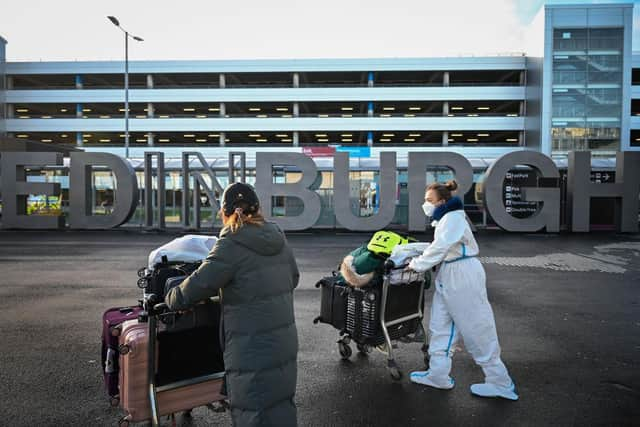International travel: Scotland’s quarantine hotel system for Covid three months on
This will reduce the requirement for passengers to stay in a quarantine hotel after arrival, with travellers from “green” and “amber” listed countries exempt from this step.
Those arriving from green list countries will need only to take a PCR test after arrival, and those from amber countries will have to self isolate and take two PCR tests.
Advertisement
Hide AdAdvertisement
Hide AdBut what effect will this have on Covid spread in Scotland and are many people are travelling to the country at the moment?


While non-essential international travel has been banned, more than 100,000 people have entered Scotland from outside the UK since the beginning of January.
Numbers were highest in the first weeks of the year, with almost 15,000 arrivals in the second week of January.
While this likely reflects more people travelling to see loved ones during the festive period, figures also dropped off sharply in the weeks after new lockdowns were announced.
Since then, around 5,000 people have arrived each week, with a high of almost 7,000 in the week before the quarantine hotel requirement came into force, and lows of 2,500 to 3,300 in the weeks immediately afterwards.
In that period around 80 per cent of the 50,000 new arrivals have been told to quarantine.
Around 70 per cent of them have been contacted by the National Contact Tracing Centre. The Scottish Government said everyone required to isolate is contacted by email, while an agreed target of people are called.
Just a fifth of those have been required to quarantine do so in a hotel – just over 8,000 people.
Advertisement
Hide AdAdvertisement
Hide AdExemptions from having to stay in a hotel include people travelling from the Common Travel Area (CTA), border security officials, defence personnel and those on diplomatic missions, seafarers, and oil and gas workers not travelling from the highest-risk countries.
Those who didn’t have to stay in a hotel should have self-isolated at home, apart from a small number of people involved in the moving of goods.
The Scottish Government has 1,300 hotel rooms available for this quarantine, in Edinburgh, Aberdeen and Glasgow, but so far just 682 have been used across three hotels: the Village Hotel in Aberdeen, the Doubletree by Hilton at Edinburgh Airport and the Holiday Inn Express at Glasgow Airport.
The managed quarantine programme has had its share of controversies, with the discrepancy between Scottish and English approach causing uproar in the first few weeks.
Scotland required all passengers arriving from anywhere outside the CTA, except for certain exemptions, to quarantine, while England placed this burden only on those coming from “red list” countries.
This lead to widespread fears that many people were simply flying into airports in England and making the journey on to Scotland by car or public transport, as there is no UK border force presence at the limit between England and Scotland.
Another cause of tension was the requirement for children travelling alone to quarantine, which meant either a child on their own in a hotel for ten days, or an adult having to isolate with them.
After pressure from parents – and some incidents of school children from abroad not being able to return to their education – children were exempted from the measure.
A message from the Editor:
Thank you for reading this article. We're more reliant on your support than ever as the shift in consumer habits brought about by coronavirus impacts our advertisers.
If you haven't already, please consider supporting our trusted, fact-checked journalism by taking out a digital subscription .
Comments
Want to join the conversation? Please or to comment on this article.
